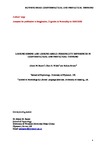Looking behind and looking ahead: personality differences in the tendency to counterfactual and future oriented thinking
| dc.contributor.author | Bacon, Alison | |
| dc.contributor.author | Walsh, Clare | |
| dc.contributor.author | Briazu, R | |
| dc.date.accessioned | 2020-01-22T08:57:40Z | |
| dc.date.issued | 2020-12-01 | |
| dc.identifier.issn | 0276-2366 | |
| dc.identifier.uri | http://hdl.handle.net/10026.1/15333 | |
| dc.description.abstract |
Counterfactual thinking (CFT) involves the mental simulation of alternatives to the past. In contrast, prefactual thinking (PFT) simulates potential outcomes that have yet to happen. Individuals differ in the extent to which they think in these ways, but we know little about how personality is implicated in these differences. This study investigated the relationship between Big Five personality traits and levels of spontaneous CFT and PFT embedded within a fictional diary entry. Results indicated that CFT was related to high neuroticism and low agreeableness, while PFT was related to low neuroticism and high agreeableness, as well as high extraversion. This suggests that CFT and PFT are, in part, dispositionally based and may be predicted by Big Five measures. This has implications for our understanding of individual differences in terms of the functionality of CFT and PFT and their potential influence on life outcomes. | |
| dc.format.extent | 111-125 | |
| dc.language.iso | en | |
| dc.title | Looking behind and looking ahead: personality differences in the tendency to counterfactual and future oriented thinking | |
| dc.type | journal-article | |
| plymouth.issue | 2 | |
| plymouth.volume | 40 | |
| plymouth.journal | Imagination, Cognition and Personality | |
| dc.identifier.doi | 10.1177/0276236620905810 | |
| plymouth.organisational-group | /Plymouth | |
| plymouth.organisational-group | /Plymouth/Faculty of Health | |
| plymouth.organisational-group | /Plymouth/Faculty of Health/School of Psychology | |
| plymouth.organisational-group | /Plymouth/REF 2021 Researchers by UoA | |
| plymouth.organisational-group | /Plymouth/REF 2021 Researchers by UoA/UoA04 Psychology, Psychiatry and Neuroscience | |
| plymouth.organisational-group | /Plymouth/REF 2021 Researchers by UoA/UoA04 Psychology, Psychiatry and Neuroscience/UoA04 REF peer reviewers | |
| plymouth.organisational-group | /Plymouth/Research Groups | |
| plymouth.organisational-group | /Plymouth/Research Groups/Centre for Brain, Cognition and Behaviour (CBCB) | |
| plymouth.organisational-group | /Plymouth/Research Groups/Centre for Brain, Cognition and Behaviour (CBCB)/Behaviour | |
| plymouth.organisational-group | /Plymouth/Research Groups/Centre for Brain, Cognition and Behaviour (CBCB)/Cognition | |
| plymouth.organisational-group | /Plymouth/Research Groups/Plymouth Institute of Health and Care Research (PIHR) | |
| plymouth.organisational-group | /Plymouth/Users by role | |
| plymouth.organisational-group | /Plymouth/Users by role/Academics | |
| dcterms.dateAccepted | 2020-01-21 | |
| dc.rights.embargodate | 2020-8-11 | |
| dc.rights.embargoperiod | Not known | |
| rioxxterms.versionofrecord | 10.1177/0276236620905810 | |
| rioxxterms.licenseref.uri | http://www.rioxx.net/licenses/all-rights-reserved | |
| rioxxterms.licenseref.startdate | 2020-12-01 | |
| rioxxterms.type | Journal Article/Review |


